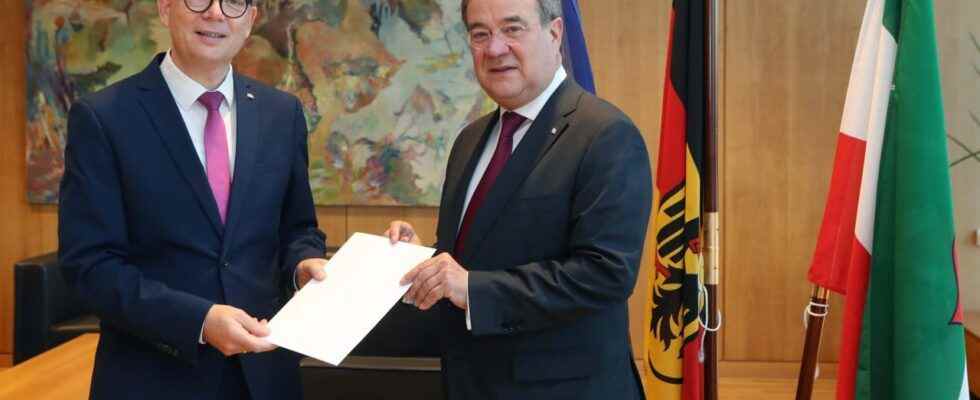There are also diplomas for being a prime minister!
This Monday, Armin Laschet (60, CDU) received the certificate of his end of office as Prime Minister of North Rhine-Westphalia. A formal act – and at the same time a turning point.
The President of the North Rhine-Westphalian state parliament, André Kuper, presented the Union Chancellor candidate with the de-LASCH certificate as a farewell.
In the morning Laschet entered the office of the President of the State Parliament without comment to declare his resignation as Prime Minister. When saying goodbye to his cabinet, he said, according to a statement from the State Chancellery: “It has been a great honor for me to shape the future of our state as Prime Minister over the past four years and to advance North Rhine-Westphalia.”
Laschet will take up his mandate as a member of the Bundestag on Tuesday. A special session of the state parliament for the election of his successor was requested for Wednesday.
Armin Laschet (CDU), Prime Minister of North Rhine-Westphalia, on the way to the office of the President of the State Parliament to resign from this officePhoto: Marius Becker / dpa
The course has been set for a change of power in North Rhine-Westphalia – and a successor is already in the starting blocks: the previous state transport minister and new CDU state chief Hendrik Wüst (46).
The CDU parliamentary group had already formally and unanimously decided on the personnel proposal on Monday, as parliamentary group leader Bodo Löttgen reported.
But that also means: On Monday, Laschet initially remained in office as a manager. As soon as the new Bundestag has been constituted on Tuesday, its deputy, NRW Family Minister Joachim Stamp (FDP), will probably take over the management of government affairs for one day.
How likely is Wüst to become head of NRW?
Wüst needs every vote for the election on Wednesday in the state parliament. The black-yellow coalition only has a single majority in the NRW state parliament. At least in the first ballot, it depends on each of the 100 CDU and FDP members of the 199-strong five-party parliament.
However, parliamentary group leader Bodo Löttgen is counting on all 100 votes for Wüst. He said: The CDU parliamentary group meeting was closed and in a good mood. “This is a good starting point for this important week,” said Wüst.
With Laschet’s declaration of resignation, the term of office of all other members of the state government also ended. Laschet personally handed them their termination certificates in the State Chancellery. According to the state constitution, the ministers remain in office until the successor takes office.
Wüst was elected the CDU’s new head of the country at the weekend and has already inherited Laschet in this office. As soon as the 46-year-old Münsterländer is elected as head of government, he will have to reappoint his ministers.
He also has to find a solution for his own house, the Ministry of Transport: Either he appoints a new transport minister for the seven months until the state elections on May 15, or he assigns the department to another ministry. He rejected statements on Monday as premature: “A prime minister appoints ministers. Now let’s wait and see. “
Laschet’s balance sheet
Laschet himself drew an interim balance of success for his black-yellow coalition: record sums have been invested in early childhood education, childcare, better educational opportunities and the renovation and expansion of the infrastructure.
In addition, his cabinet had launched an ambitious climate protection law and the first nationwide climate adaptation law, strengthened the police in terms of personnel and technology, declared war on criminals with a “zero tolerance strategy” and cut bureaucracy.
The Prime Minister’s resignation took place in the run-up to the constituent meeting of the German Bundestag tomorrow, Tuesday (October 26), to which Laschet will then belong as a newly elected member. According to the state constitution, a member of the state government cannot be a member of the Bundestag at the same time. When the Bundestag meets, its executive office ends.
